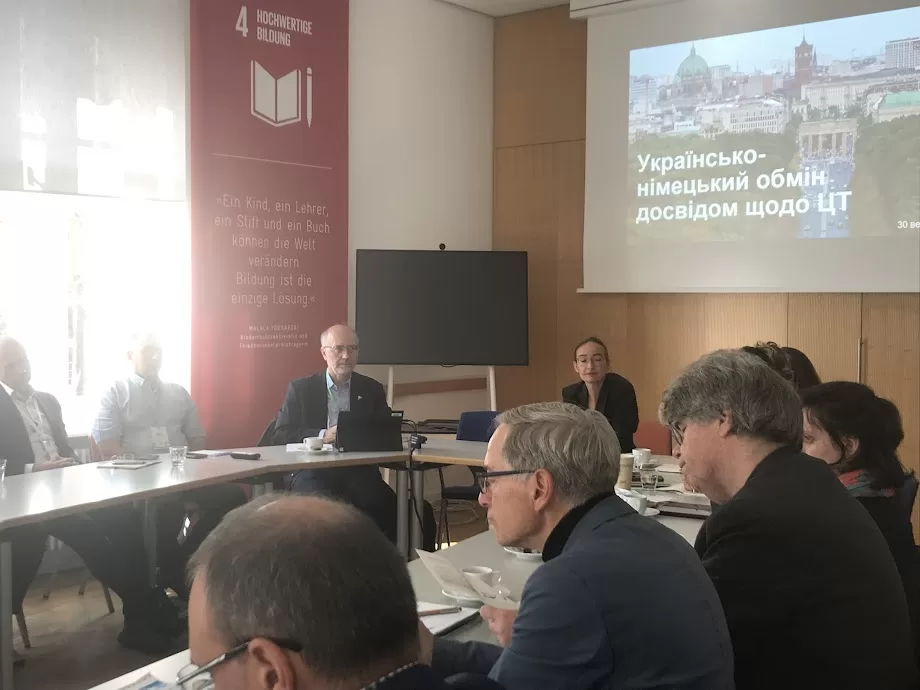Ukraine has an extensive district heating (DH) system with a complex and far-reaching network of heating pipelines and significant generation capacities. This system was established many years ago, and in light of shifts in energy sourcing, rising environmental standards, and increased energy costs, it became evident that the sector needed reform. The experience of EU countries that maintain and develop their own DH systems is invaluable, as it offers insight into achieving greater energy efficiency, environmental sustainability, and resource conservation.
From September 28 to October 5, 2024, Ecoclub, in partnership with GIZ, organized a study tour to heating companies in Germany (Berlin) and Poland (Lublin). The tour aimed to learn from European countries’ approaches to transforming DH services. Participants included representatives from:
– The Ministry of Community and Territorial Development,
– The State Agency on Energy Efficiency and Energy Saving,
– The National Commission for State Regulation of Energy and Public Utilities (NKREKP),
– Local governments,
– District heating companies from Kyiv, Kryvyi Rih, Zviahel, Kostopil, Zhytomyr, Cherkasy, and Khmelnytskyi.
They learned about the operations of heating companies, their modernization and transition to renewable energy sources, as well as tools for enhancing heating quality.
On the first day, participants visited the GIZ office in Berlin, where they attended presentations by the German Energy Agency (DENA), the district heating department of the German Ministry for Economic Affairs and Climate Action (BMWK), and Diehl Metering. During the meeting, DENA representatives outlined the framework conditions for DH sector development in Germany, including energy consumption structures and sources of heating for residential buildings. Special emphasis was placed on the legislative foundations of the energy market, as well as EU and German regulatory documents concerning building energy efficiency and heating system requirements.
The speakers emphasized the challenges faced by Germany’s district heating sector in achieving the “green transition”: by 2045, all heating systems and networks must be fully powered by renewable energy sources. They also provided insights into the urban heating planning process in Berlin, known as municipal heat planning.
Using examples from Berlin neighborhoods with a high concentration of multi-family residential buildings, participants explored various modernization and energy-efficiency measures for housing stock. Ralf Protz, head of the “Competence Center for Multi-Family Housing” association, provided insights on planning, funding, repair, and upgrading of buildings and surrounding areas, addressing both resident needs and energy efficiency standards. During a tour of the neighborhood, participants visited the association’s office, viewed a museum-apartment, and examined a building’s courtyard.
An excursion in one of the modernized districts.
BEW BERLINER ENERGIE UND WÄRME AG (BEW)
Participants also learned about the operational experience of German district heating companies, particularly the joint-stock company “Berlin Energy and Heat” (BEW BERLINER ENERGIE UND WÄRME AG) and the GmbH “Operation and Management Company for Cogeneration Plants, Berlin” (BTB GmbH).
The headquarters of BEW is constructed according to zero-emission standards. This means that its energy needs are fully met by renewable energy sources.
BEW provides district heating to approximately 1.4 million residential buildings in Berlin. It also offers localized solutions for centralized cooling and individual decentralized energy projects. The company operates the largest district heating system in Western Europe, encompassing around 2,000 kilometers of heating networks and 5.5 GW of installed thermal capacity.
BEW’s activities include the production, procurement, and sale of all types of energy, including electricity, heat, and steam. Additionally, the company is involved in the construction and operation of relevant production facilities, as well as the construction and operation of pipelines and installations for the transportation and distribution of heat, cold, and steam, and the provision of related services.
Company representative Denis Taubert emphasized that since 2020, the company has ceased using lignite coal and has transitioned to cogeneration plants. Additionally, the company operates heat pumps, which allow it to leverage fluctuations in electricity prices to maximize profits. Taubert introduced participants to the two-tier pricing system for heat.
Alexander Novak, the head of the Network Integration and Technology Department, outlined the company’s practical steps toward transforming district heating. Specifically, the company plans to completely eliminate the use of hard coal by 2030 and to replace natural gas with alternative sources by 2040, prioritizing hydrogen technologies, waste heat recovery from excess emissions of industrial and chemical processes, biomass heat, as well as the use of heat pumps and thermal storage.
The tour program also included a visit to the Berlin-Mitte combined heat and power plant, one of the most modern and energy-efficient facilities operated by BEW. The thermal output generated here provides district heating to 60,000 apartments and 500 large consumers, including public institutions, commercial enterprises, and industrial facilities.
Berlin-Mitte CHP Plant.
The core of the Berlin-Mitte CHP plant is a gas turbine installation that simultaneously generates electricity and heat using gas turbines, boilers, waste heat recovery systems, and an installed steam turbine. The fuel utilization efficiency is approximately 90%.
Visit to BTB GmbH (Operation and Management Company for Cogeneration Plants, Berlin)
Another district heating company, BTB GmbH, which is part of the E.ON group, specializes in the design, financing, construction, and operation of energy installations, energy networks, and decentralized individual solutions. The company provides combined heat and power services, utilizing cogeneration.
BTB supplies heat, electricity, cooling, and steam to approximately 80,000 apartments, commercial buildings, public institutions, and critical industrial and research facilities in Berlin.
The company operates several cogeneration plants that simultaneously produce heat and electricity, as well as biomass power plants, heat pumps, absorption chillers, and solar power plants. This diverse portfolio allows for both mass and individualized energy solutions. Between 2021 and 2023, the company installed two large water heat pumps at the Schöneweide power plant, with a total capacity of 7 MW. These pumps utilize water from the nearby Spree River as a heat source when the water temperature is sufficiently high (at least 8°C), primarily from spring to autumn and during the summer months. During the visit to the Schöneweide CHP plant, participants observed the operation of river water heat pumps in real-world conditions.
Schöneweide CHP Plant. Heat Pump on the Spree River.
During the presentation, the company’s director, David Weiblein, discussed plans for the gradual reconstruction of the Schöneweide CHP plant. This includes the installation of cogeneration units prepared for hydrogen technologies, deep geothermal installations, and the expansion of storage facilities and boiler houses that will utilize biomass. The company is conducting research and plans to implement new technologies, including the installation of the largest deep thermal storage unit in Germany, with a capacity of 30 GWh.
CHP Adlershof. Thermal Storage Unit.
Participants also visited the water storage tanks (thermal storage units) at the Adlershof CHP. These units ensure the stability of energy supply and enhance the efficiency of the heating system, allowing for the accumulation of heat during periods of low demand and its utilization during peak loads.
The participants emphasized that the installation of thermal storage units in existing heating systems in Ukraine could modernize the infrastructure without significant capital investments. In the context of the energy crisis, these storage units can provide stability within the heating supply system.
Lublin Heat Energy Company (LUBELSKIE PRZEDSIĘBIORSTWO ENERGETYKI CIEPLNEJ S.A.)
Participants also visited the Lublin Heat Energy Company (LPEC), one of the largest suppliers of district heating in Poland. The company’s primary focus is on supplying heat to residential buildings, schools, hospitals, shopping centers, government institutions, religious buildings, and sports facilities, while also maintaining the technical integrity of the Lublin heating network.
LPEC provides heat to nearly 75% of households in Lublin, heating approximately 250,000 residents. The heat is distributed through a network that spans a total length of 469.1 kilometers via 2,419 heating nodes.
The Lublin heating system ranks among the top 20% of the most efficient heating networks in the country. Nearly 83% of the heat is generated through cogeneration processes. By 2025, it is projected that 25% of the energy will be produced from biomass (renewable energy sources), while 65% will come from natural gas. Currently, the Lublin heating system meets the criteria for efficient heating networks in accordance with the Energy Efficiency Directive requirements.
LPEC Presentation
The participants engaged in a discussion regarding the steps needed to implement European decarbonization requirements in Poland. The speakers included representatives from LPEC (Lubusz Heating Company) and officials from the city government of Lublin.
Megatem EC Lublin CHP Plant
Participants visited the Megatem EC Lublin Combined Heat and Power (CHP) plant, one of two producers supplying thermal energy to the city’s LPEC network. They learned about the use of cogeneration units and plans to phase out coal usage. The plant shared its experiences in implementing the legislative framework outlined in the European Union’s decarbonization roadmap in real operational conditions. Specifically, they discussed the scheduling and temperature regulation of the central heating system during the heating season in Poland.
The Megatem EC facility converts biomass into thermal and electrical energy, making it an environmentally friendly solution compared to traditional energy sources. In 2023, the fuel composition for electricity generation at MEGATEM EC in Lublin consisted of 56.92% renewable energy sources, including biomass, and 43.08% hard coal.
Feedback from Participants
“It was beneficial to visit the largest heating enterprises in Germany and Poland to understand how they are developing and modernizing this sector abroad. Our current priority is to protect the centralized heating sector from potential missile attacks by the enemy. After our victory, we would like to adopt the experience of modernizing and developing heating enterprises, as the EU countries do,” said Boris Kyzima, Chief Engineer of Khmelnytskteplokomunenergo.
“I viewed the study trip primarily through the lens of the current realities regarding electricity generation in Ukraine and its delivery to consumers. In our case, the consumers are the enterprises that provide heating services. Therefore, I was particularly interested in the experiences of our German colleagues in the energy supply sector—specifically, the combined production of heat and electricity through cogeneration. I also appreciated their approach to utilizing renewable energy sources (RES). Just three years ago, the Berlin energy supply company BTB installed two water heat pumps that use water from the Spree River as a heat source. Additionally, the detailed information I received about the modernization of the housing stock in Berlin was very useful for me. By the way, in my hometown of Kostopil (Rivne region), work is currently being completed on the comprehensive thermal modernization of five multi-apartment buildings. I am grateful for the opportunity to see firsthand the implementation of innovative solutions in the field of centralized heating and to learn from the energy transition to renewable energy sources,” said Yuriy Kuzniuk, Deputy Mayor of Kostopil.
The study trip was organized by Deutsche Gesellschaft für Internationale Zusammenarbeit (GIZ) GmbH and the Ecoclub NGO in collaboration with the Berlin Pankow-Rivne Partnership within the framework of the projects “Closing the Loop: A Just Energy Transition Designed by Cities and Regions,” funded by the European Commission, and “Reforming the Centralized Heating Sector of Ukraine” (ReWarm), financed by the German Federal Ministry for Economic Affairs and Climate Action (BMWK) through the International Climate Initiative (IKI) and implemented by GIZ.











